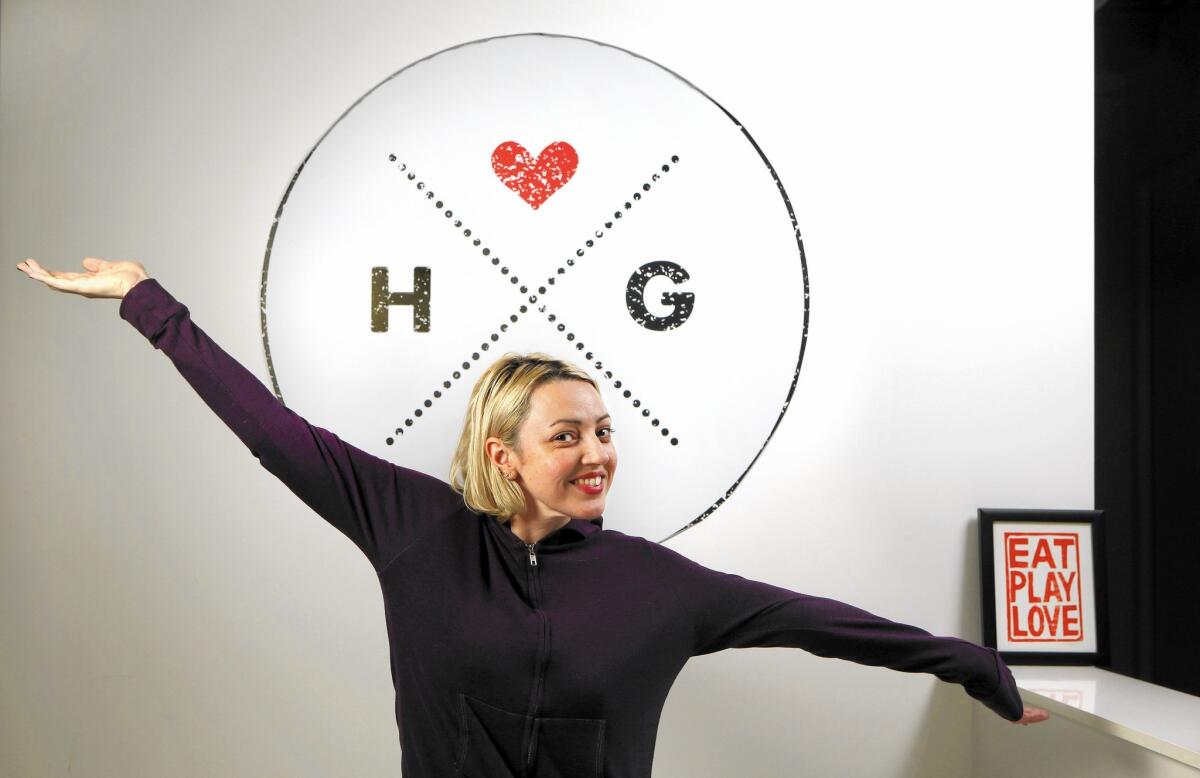How I Made It: She’s made HelloGiggles a serious success

- Share via
The gig: Former TV producer Sophia Rossi, 34, is chief executive of downtown Los Angeles-based HelloGiggles, an ad-supported destination online for news and entertainment aimed at girls and young women. Time Inc. bought the start-up for around $30 million in October, allowing for more than 30 new hires to sell ads and to create shows, movies and podcasts. HelloGiggles draws about 11 million monthly visitors.
Foundation: Rossi grew up in Beverly Hills and earned steady pay as a babysitter and summer camp counselor. The jobs showed her alternative routes to make money, and she decided to skip college.
Later, she imagined HelloGiggles as an online summer camp, where writers are paid “after-school baby-sitting money” for their efforts.
TV career: Rossi helped produce reality TV series including “The Hills” and “The City” as well as the mega-hit “Glee.” But she wanted to get away from the pop culture theme and sought to produce branded video — online clips sponsored by advertisers that aren’t full-on traditional ads.
Gym meet: At the gym in 2011, Rossi fell into conversation with actress-musician Zooey Deschanel and writer Molly McAleer about creating a “Funny or Die” for women, referring to the popular raunchy comedy website that had dabbled with branded video. Deschanel hated the negative messages that barraged her on social media and insisted the Internet lacked a positive place for women. Could a site avoid snark and gossip, but still entertain? Deschanel immediately booked a follow-up chat for the trio. “For me, it was a discussion,” Rossi said. “Zooey was really passionate about it. She said let’s get together and talk to agents and managers and see what we can do.”
Cost considerations: Making videos cost more than the women expected, even with a sponsor. They managed to finish one and place it on a simple website. Working out of Rossi’s apartment, they linked to the video from their social media profiles, and to their amazement, visitors surged. Venture capitalists weren’t backing many media companies at the time, so they had to grow slowly and drop the emphasis on video, Rossi said. By the company’s fifth anniversary in May, it will have more than 1,500 writers sharing stories about their meals, friends, work, hobbies and health. Recent posts included: “I’m not sure about kids and that’s okay” and “Cadbury Creme Eggs are now a pizza topping, how do we process this?”
Smart moves: Bringing in experienced executives to fill roles including editor-in-chief and chief financial officer led to a big boost in the number of viewers, Rossi said. She set the website’s “tone” and had “instincts,” she said. But Rossi, McAleer and Deschanel wanted data-minded experts to provide extra guidance. “When you build a company, you think it’s going to be the biggest in the world or nothing,” Rossi said. “You don’t really think about the rational plan.” She said she found the right hires by accepting every meeting request, including from people she met while working out of SoHo House in West Hollywood and from investors who gave $1.25 million in capital.
Turning to Time: The Time sale was intended to accelerate a return to video-making. In addition, the company that had about 18 employees in October now has access to thousands of people through potential partnerships with Sports Illustrated, People and other Time businesses.
Managerial no-words: Rossi prefers that employees say “we have a lot going on” and “a challenge is” instead of “I’m overwhelmed” and “there’s a problem.” She fears that the latter options induce a “chaos high.” And nothing productive comes from that, she said, recalling her days as an assistant always worried that a small misstep would draw anger from her boss. The former sayings invite help, she contends, setting a positive office mood.
Shabbat: Rossi, who is Jewish, doesn’t work or use her phone from Friday evening to Saturday evening in observance of Shabbat, the Jewish Sabbath. She adopted the regimen 31/2 years ago, tired by the “always-on” start-up culture. It was difficult at first. Her positive energy diminished when hundreds of emails awaited her Saturday night. But co-workers adapted. Now Rossi jokes that she feels forgotten when her inbox is empty. If employees “feel like the boss is not going to be attacking over the weekend, they can actually enjoy the weekend,” Rossi said.
Personal: Rossi is a graduate of Beverly Hills High School. She lives in West Hollywood and meditates twice a day. Rossi is the author of “A Tale of Two Besties.”
Twitter: @peard33
More to Read
Inside the business of entertainment
The Wide Shot brings you news, analysis and insights on everything from streaming wars to production — and what it all means for the future.
You may occasionally receive promotional content from the Los Angeles Times.











